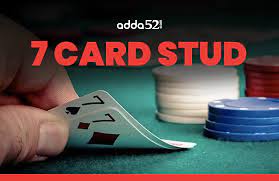
7-Card Stud Poker
This table helps clarify the relative strengths of various hands, vital for strategic decision-making 188BET.
Strategies and Tips for Playing 7-Card Stud Poker
Mastering 7-Card Stud Poker requires more than just knowing the rules; it demands strategic thinking, psychological insight, and situational awareness. Because each player’s hand develops over multiple rounds with partial information, decision-making must be meticulous and calculated.
Starting Hand Selection and Position
The importance of starting hand selection cannot be overstated in 7-Card Stud. Since players see some of each other’s cards early on, choosing which hands to play and when to fold can be decisive.
- Playing Tight vs. Loose: Conservative players tend to play only premium starting hands, folding weaker hands early. Aggressive players might see more potential in marginal hands, leveraging bluffing and betting to force errors.
- Position Advantage: Although position in 7-Card Stud isn’t as pronounced as in other variants, acting later in betting rounds allows better observation of opponents’ actions, providing informational advantage.
- Analyzing Upcards: The key is to monitor the strength and pattern of visible upcards. For example, a high pair or suited connectors on the upcards can indicate potential for strong hands, prompting more aggressive play.
Reading Opponents and Psychological Tactics
Since much of 7-Card Stud involves observing and interpreting visible cards and betting behaviors, reading opponents becomes essential.
- Pattern Recognition: Recognize betting patterns—aggressive raises may signal strong hands, while cautious play could indicate weakness or bluffs.
- Timing and Bet Sizing: Use timing and bet sizing to mislead opponents. For instance, sudden large bets after weak upcards may be designed to scare opponents out or induce mistakes.
- Counting Upcards and Memory Play: Remembering what cards have been seen reduces uncertainty about remaining cards, enabling better predictions of opponents’ possible hands. Developing a mental tracking system enhances strategic depth significantly.
Pot Odds and Risk Management
Effective 7-Card Stud players calculate pot odds meticulously, comparing the potential winnings to the cost of calling or raising.
- Evaluating Draw Probabilities: Since many hands develop based on unseen cards, estimating the likelihood of completing a strong hand guides betting decisions.
- Fold Equity: Understanding when to fold to minimize losses is as important as aggressive plays. Not every hand warrants a push, especially when the potential risk outweighs the reward.
- Bankroll and Variance: Proper bankroll management buffers against downswings inherent in poker’s variance. Recognizing the limits of short-term luck and focusing on skillful play ensures sustained success.
Adapting to Different Game Formats
7-Card Stud Poker comes in several formats, such as Hi/Lo and Eight-or-Bewer, each requiring tailored strategies.
- High-only Games: Focus on strong hands and reading opponents’ betting patterns to avoid costly mistakes.
- Hi/Lo Split Games: Balance between aiming for the high hand and trying to secure the low hand. Flexibility and knowledge of hand ranges are crucial.


